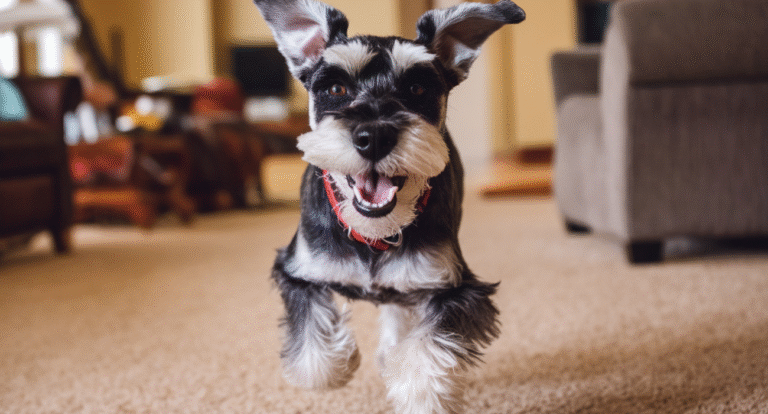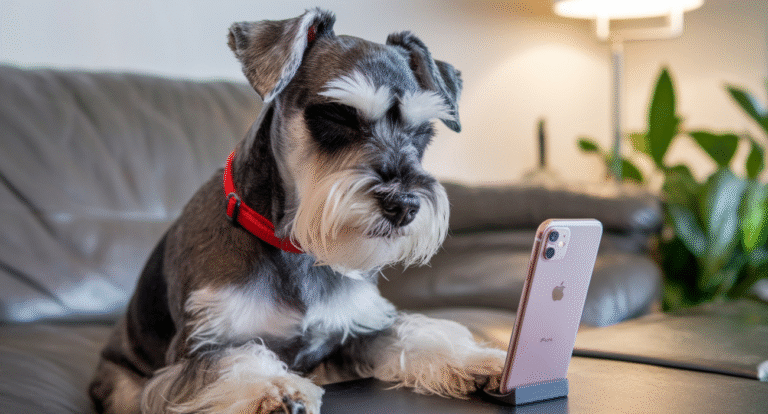Constant begging can be frustrating. Use these easy techniques to stop the behavior while still keeping your schnauzer happy and loved.
Your Miniature Schnauzer didn’t wake up one morning and decide to become the family’s most shameless dinner guest. Nope, they learned this behavior from the best teacher in the world: you. Every time those adorable whiskers twitched and you caved with “just this once,” you were essentially handing out a PhD in Advanced Begging Techniques. But here’s the plot twist: you created this adorable monster, which means you absolutely have the power to transform them back into a well-mannered dinner companion.
Receive Content Just Like This to Your Inbox Every Morning
Let’s be brutally honest here. Your Schnauzer isn’t begging because they’re starving. They’ve figured out that their Oscar-worthy performance of “Starving Orphan Dog” works like a charm, and they’re milking it for all it’s worth.
Why Do Schnauzers Beg So Much?
Miniature Schnauzers are basically furry little Einsteins when it comes to reading human behavior. They’ve studied your patterns better than any behavioral scientist ever could. They know exactly when you sit down to eat, which family member is most likely to crack under pressure, and precisely how long to maintain eye contact before you crumble.
The truth about dog begging isn’t about hunger; it’s about learned behavior that gets reinforced every single time we give in to those irresistible faces.
This isn’t accidental behavior. Your Schnauzer has conducted thousands of tiny experiments to perfect their technique. They’ve learned that a head tilt increases success rates by 40%, and that a strategically placed paw can seal the deal.
Why This “Innocent” Habit Isn’t So Innocent
| Health Risk | Why It Matters | Schnauzer-Specific Concern |
|---|---|---|
| Pancreatitis | High-fat human foods trigger inflammation | Schnauzers are genetically predisposed |
| Obesity | Extra calories add up fast | Small dogs gain weight quickly |
| Digestive Issues | Human food disrupts their system | Can lead to chronic stomach problems |
| Behavioral Problems | Begging escalates to food aggression | Creates mealtime stress for everyone |
Those innocent table scraps aren’t just adding extra calories. For Schnauzers, they’re playing Russian roulette with a breed that’s already prone to serious digestive issues. Pancreatitis in particular can be life-threatening and incredibly expensive to treat.
But let’s talk about what this does to your family dynamics too. When your dog becomes a professional beggar, mealtimes transform from peaceful family gatherings into high-stress negotiations. Kids start sneaking food under the table, adults feel guilty for eating, and your poor Schnauzer gets more anxious and demanding with each passing day.
The Four-Step Schnauzer Begging Intervention
Step 1: Go Cold Turkey (No Pun Intended)
This is where most people fail spectacularly. You cannot have “just one more time” or “this tiny piece won’t hurt.” Your Schnauzer doesn’t understand exceptions; they only understand patterns. Every single time you give in, you’re basically telling them, “Keep trying! Eventually, I’ll crack!”
Step 2: Create a Mealtime Safe Zone
Designate a specific spot where your Schnauzer must go during human mealtimes. This could be their bed, a mat, or even just a particular corner of the room. The key is consistency. Every single meal, they go to their spot. No exceptions, no negotiations.
Start by physically guiding them there, then reward the heck out of them for staying put. We’re talking praise, gentle petting, maybe even a special (dog-appropriate) treat after your meal is finished.
Step 3: Master the Art of Strategic Distraction
The best defense against begging is a good offense. Give your Schnauzer something better to do than stare at your food.
This is where puzzle toys become your secret weapon. A Kong stuffed with their regular kibble, a snuffle mat, or a lick pad can keep those busy Schnauzer brains occupied while you eat in peace. Time it right, and they’ll be so focused on their own “meal” that they’ll forget to beg for yours.
Step 4: Rally the Troops
Here’s where most families completely sabotage themselves. Everyone in the household must be on the same page, and by everyone, I mean everyone. Your spouse, your kids, your mother-in-law who thinks rules don’t apply to her, and definitely that one friend who always insists “it’s just a tiny piece.”
Have a family meeting. Make it clear that feeding the dog from the table is now a household crime punishable by dish duty for a week. Post a sign on the refrigerator if you have to. Whatever it takes to get everyone committed to the same goal.
What Success Actually Looks Like
Don’t expect overnight miracles. Your Schnauzer has been perfecting their begging craft for months or possibly years. They’re not going to give up their most successful life skill without a fight.
Week 1 will probably involve some serious drama. Expect increased whining, more intense staring, and possibly some creative new begging positions you’ve never seen before. This is called an “extinction burst” in behavior psychology, and it means your training is actually working.
By week 2, you should notice the begging behavior starting to decrease in intensity. Your Schnauzer might still try their luck, but with less conviction.
Real success isn’t just the absence of begging; it’s the presence of calm, polite behavior during mealtimes. Your goal is a dog who can exist peacefully in the same room as food without turning into a furry tornado of want.
Most families see significant improvement within 2-3 weeks if they stay consistent. By month two, you should have a completely different dinner experience.
The Beautiful Side Effect Nobody Talks About
Here’s what happens when you successfully break the begging cycle: your relationship with your Schnauzer actually gets better. Without the constant tension of food negotiations, you can enjoy each other’s company more. Your dog learns to trust that they’ll be fed regularly and appropriately, which reduces their anxiety around food.
Plus, you’ll feel like a rockstar pet parent instead of feeling guilty every time you want to enjoy a meal. And honestly? Your Schnauzer will be healthier, happier, and more relaxed too.






